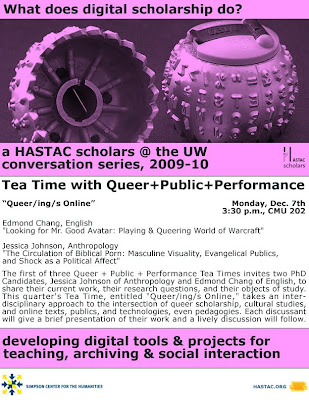Monday, December 7
3:30-5:00 PM
Simpson Center Conference Room
University of Washington, Seattle
Queer/ing/s Online
Q+P+P Tea Times will be held once per quarter. These colloquia hope to encourage conversation, exchange, and open discussion. Each Tea Time will invite two or three faculty members, graduate students, even undergraduates who will start the conversation by briefly sharing their work, highlighting how that work aligns with the working goals of the Q+P+P and how their work negotiates the intersections of queer critique, public theory, and performance studies. The main goal of the Tea Times is to foster intellectual, academic, and political exchange that crosses disciplinary boundaries. Refreshments will be served.
This Q+P+P Tea time is co-presented with the HASTAC Scholars at the University of Washington.
“Looking for Mr. Good Avatar: Playing & Queering World of Warcraft”
Edmond Chang, English, HASTAC Scholar
My discussion of Blizzard Entertainment’s World of Warcraft attempts to identify and interrogate sexuality, gender, and race in WoW to theorize and analyze the ways these logics are both normative and subversive. In other words, in a game of fantasy race and cybermediated desire, how and where and why might real world queerness, gender, and race be rendered and taken for granted? Furthermore, in the imagining (perhaps intrusion) of real world logics into the game, how might other formations, such as sexuality, be left unsettled or open? Looking at game play and game narratives, particularly the in-game Valentine’s Day holiday event “Love is in the Air,” my work argues for a productive opportunity in the play of, with, and play in
sexuality, gender, and race to discover countergaming potential and practices that challenge and exploit in- and out-of-game stereotypes and normativity.
“The Circulation of Biblical Porn: Masculine Visuality, Evangelical Publics, and Shock as a Political Affect”
Jessica Johnson, Anthropology
In my presentation, I will explore how and what kind of evangelical publics are generated through the digital circulation of sermons, blogs, and visual texts. I examine discourses on gender, sex, and sexuality as produced by a Seattle megachurch that specifically targets the least likely demographic to attend Christian services in the United States: 18-30 year old males. Reading the texts generated for and in response to a particular sermon series that explicitly discusses sexual freedom within a “biblical” (normatively gender distinct, heterosexual) marriage, I ask what it means to deploy “shock” as a political affect in the transnational dissemination of “biblical porn.”
